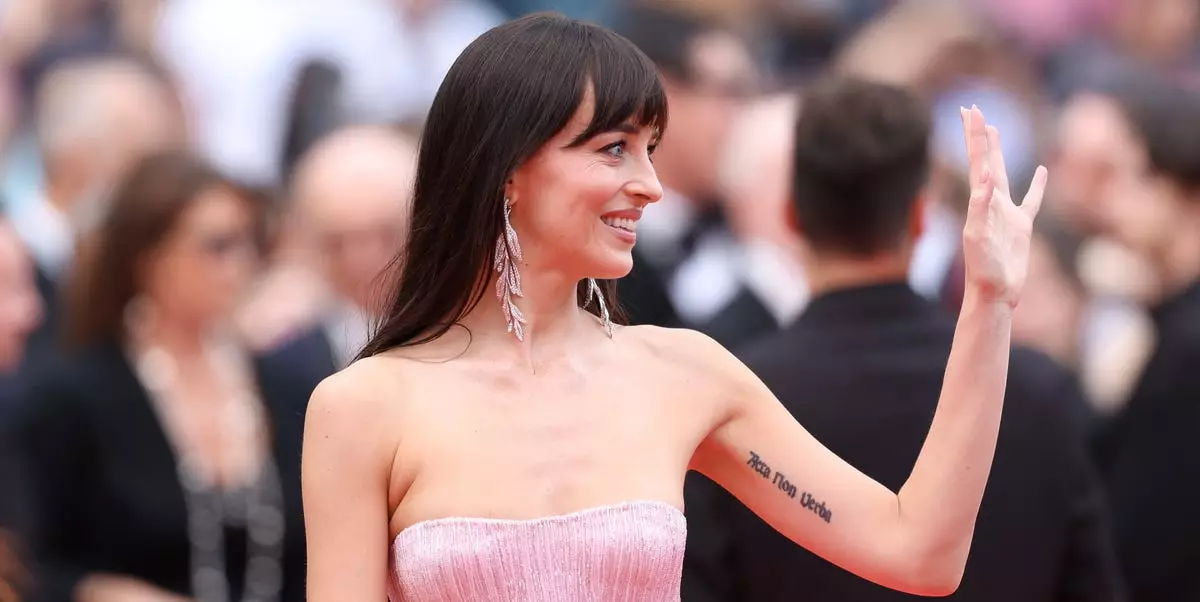Dakota Johnson has made quite an impression at this year’s Cannes Film Festival, showcasing not just her fashion flair but also her depth as an actress and producer. The stunning transition from a sleek black midi dress earlier in the day to a whimsical cotton-candy pink fringe gown by Gucci during the premiere of “Highest 2 Lowest” perfectly encapsulates her bold and playful style. This vibrant hue resonates as a trend this spring, with notable appearances from fellow actress Kristen Stewart, who also embraced soft pastel tones. Johnson’s choice of silver earrings completed her look with just the right touch of elegance and sophistication.
Cannes isn’t merely a backdrop for glamorous photo ops; it serves as a platform for artists to share stories that matter. Johnson’s selections reflect more than just fashion sensibilities—they resonate with the evolving narrative around identity and expression.
Unpacking “Splitsville”
Later that evening, Johnson would be introducing her own film, “Splitsville,” further solidifying her role not just as an actress but as a thought leader in the conversation surrounding modern love and relationships. In her conversation with Variety, Johnson articulated the film’s premise with extraordinary eloquence. “It’s an interesting tone because I guess, off the bat, it reads as a comedy, but it’s a very soulful, unique comedy about two couples and the challenging dynamics of their relationships,” she said, hinting at a layered narrative exploring the complexities of love and the interconnections between partnerships.
Her remarks on the theme of non-monogamy are particularly poignant in today’s context. Johnson’s perspective—that there is no singular “right” way to love—encapsulates the emerging liberation many feel from traditional relationship structures. By challenging the notion of monogamy and considering the possibility of growth, both together and individually, her words resonate with a generation eager to redefine love.
The New Age of Relationship Dynamics
Interestingly, Johnson dives deeper, presenting a compelling discussion on the imperfections of human connections. She poses a thought-provoking inquiry: “Are we starting to evolve into people who don’t tolerate each other and don’t heal and don’t grow?” This introspective angle invites us to reflect on our own relationships—are they avenues for growth or just cycles of frustration? Could the frequent breakups that mark modern love be indicative of an unwillingness to confront challenges?
By pointing out that relationships often dissolve during phases of personal growth, Johnson sheds light on a critical contradiction in contemporary love. There’s an unspoken expectation that love should flow effortlessly, and when it becomes tough, many choose to escape rather than navigate the complexities. Tackling the issues of both monogamy and non-monogamy requires honesty, kindness, and the willingness to engage with discomfort, which she emphasizes in her dialogue.
The Audacity of Self-Exploration
Johnson’s approach to love also invites a reflection on self-exploration. “If you want to have multiple relationships in your life, great,” she conveys, pushing back against societal norms and revealing the liberating potential of diverse forms of love. Simultaneously, she acknowledges the fear that accompanies this journey—fear of vulnerability, of exposing one’s flaws, and the irrational dread of risking emotional investment. Yet, within that fear lies a potential for profound connection and understanding.
In a world bursting with evolving definitions of partnership, Johnson’s insights strike a powerful chord. They encourage acceptance of the myriad ways one can experience love and relationships, while simultaneously challenging us to consider whether we are truly committed to our partners, or merely fleeing when faced with difficulty.
In stating that “everything works, or it can,” Dakota Johnson lays the foundation for a much-needed dialogue around love in its many forms. Her journey, marked by personal evolution and a commitment to authenticity, reflects a larger cultural shift—one that embraces diversity in our emotional connections. Thus, she ignites hope for a future where love is radical, vibrant, and limitless.

